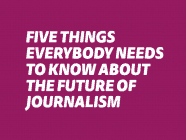With their long academic traditions, university-based journalism fellowship programmes look like relics from the past, but they are in fact needed now more than ever. The Nieman Fellowships at Harvard University and the Reuters Fellowships at the University of Oxford are celebrating their anniversaries nearly at the same time in September. The oldest and still most renown midcareer program for journalists at Harvard is 75 years old, while its European counterpart at Oxford looks back at 30 years of history. At a time when text messages are replacing written letters and people read tweets instead long newspaper articles, these one-year programs offer journalists the unique opportunity to recharge and to engage in investigative research without any deadline pressure.
“The creation of the Reuters Fellowship program 30 years ago was strongly inspired by the Nieman Fellowships,” said David Levy, the Director of the Reuters Institute for the Study of Journalism.
There are some key differences. “Nieman is generally half American, we are much more international,” said Levy. “A maximum of ten percent of our Fellows are British. In recent years our Fellows have had to focus on a research paper dealing with journalism. This leads to professional self-reflection and to cross fertilization with our own media and journalism research. In our view it also increases their ability to contribute to their organisations and the development of journalism in their country on their return”
On both sides of the Atlantic, those organising anniversary celebrations made sure journalists and other people interested in media who could not participate directly could still be involved. The Nieman Center put some of the best contents of their library online as summer readings The Reuters Institute for the Study of Journalism has flown in Mark Thomson the CEO of the New York Times Co. and former general director of the BBC, as a keynote speaker and asked him to reflect the “Economics of Newspaper Journalism”.
Both these programmes do serious, important work. But the most courageous leap into the digital future of journalism has been made elsewhere, in the Silicon Valley: A few years ago, Stanford University reinvented its Knight Fellowships. There, journalists have the opportunity to develop their entrepreneurial skills and to work for one year on projects which will push forward the frontiers of journalism, both economically and technically. Some of their recent work is particularly impressive.
One year programs, similar to those offered by Oxford and Harvard, are being offered at the Freie Universität Berlin and in the U.S. at the University of Michigan, and the University of Maryland. MIT offers a programme for science journalists and Columbia University has one for business journalists. Other one year midcareer programs at the University of Chicago, the Yale Law School and at Princeton University were discontinued some years ago, but the U.S. is still well ahead of Europe in the number of programmes it offers mid career journalists.
Research on the infrastructure of journalism is more important in Europe now than ever. Charitable foundations, trusts and the EU could consider any money they spend in this area to be money well spent.
The Reuters Institute for the Study of Journalism is part of the European Journalism Observatory network.
First published: NZZ on 10. September 2013
Photo credit: Alexandra H. / pixelio.de
Tags: Harvard Nieman Foundation, Journalism, Reuters Institute for the Study of Journalism














































